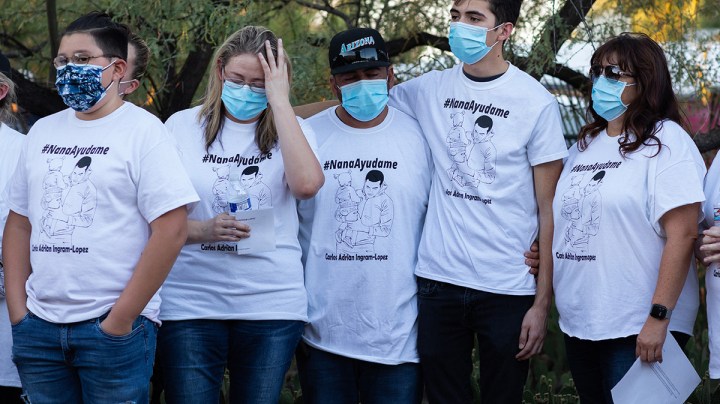Officers Involved in Death of Carlos Ingram-Lopez Will Not Be Charged

Community members and family wear shirts that read "Nana Ayudame or Nana, help me" in Spanish at a vigil for Carlos Adrián Ingram Lopez on June 25, 2020 in Tucson, Arizona. Photo by Caitlin O'Hara/Getty Images
No charges will be filed against three officers involved in the death of Carlos Ingram-Lopez, a 27-year-old who died in police custody in April at his home in Tucson, Arizona, NPR reports. Insufficient evidence was cited by Pima County, Arizona, prosecutors—despite having found that the officers “failed to follow protocol and created an ‘unjustifiable risk.’“
Early in the investigation, local Police Chief Chris Magnus resigned, as did the officers—Jonathan Jackson, Samuel Routledge, and Ryan Starbuck—who took the call.
But advocates for Ingram-Lopez say that’s not enough. These officers “should have been aware of the potential risk of death,” a report from the prosecutor’s office states.
A video released in June shows officers handcuffed the cooking school grad facedown, covering his face in plastic blankets–including a “spit sock,” intended to prevent COVID-19 spread–for about 12 minutes. During this time, Ingram Lopez yelled, “I can’t breathe,” begged for water and called for his grandmother. He died of cardiac arrest on the scene.
His grandmother originally called 911; Ingram-Lopez was drunk and behaving erratically, she’d said. Police arrived to find Ingram-Lopez allegedly naked in his garage in a state of “excited delirium,” according to Chief Magnus.
Rather than employ the appropriate “assist approach,” the trio went straight for arrest, a panel of experts and community members in Tucson concluded.
That the dispatcher who received the call from Ingram-Lopez’s grandmother did not speak Spanish is another contributing issue, they noted. Ingram-Lopez had consumed drugs, and she had told them. But the dispatcher did not deliver that information to police.
It was concluded by the county medical examiner that the cardiac arrest Ingram-Lopez suffered was related to “cocaine intoxication and physical restraint,” plus an existing condition of “an enlarged heart.”
Another autopsy, however, this one independently ordered by Ingram-Lopez’s family, pointed to asphyxia (suffocation) as the cause of Ingram-Lopez’s death.
Ingram-Lopez’s tragic story was preceded by the police custody death of another Latino resident of Tucson–Damien Alvarado, 29–in which the use of a “spit sock” was also involved, as well as drug consumption. Alvarado died on March 22: he too had complained to officers of an inability to breathe beneath the spit sock, became more compliant while detained (after initially resisting), then ultimately died of cardiac arrest.